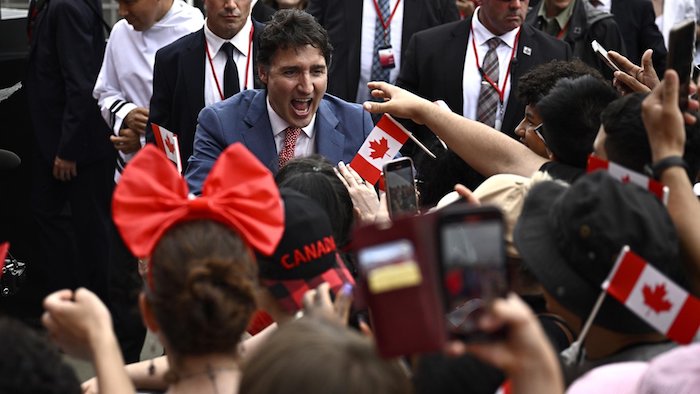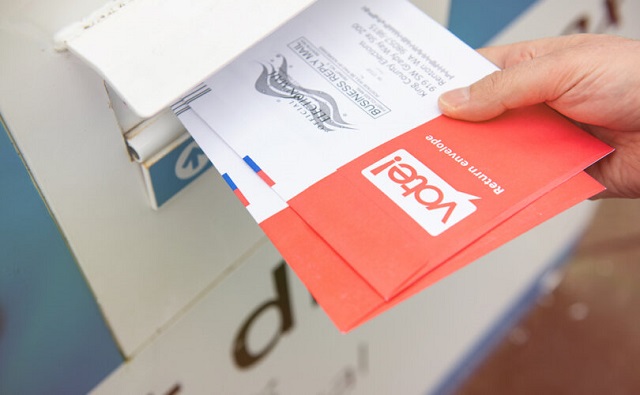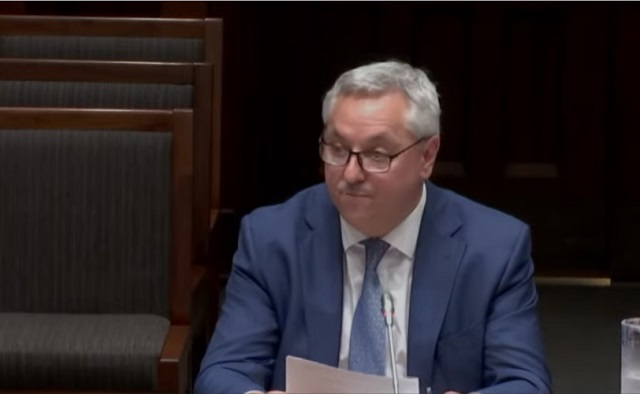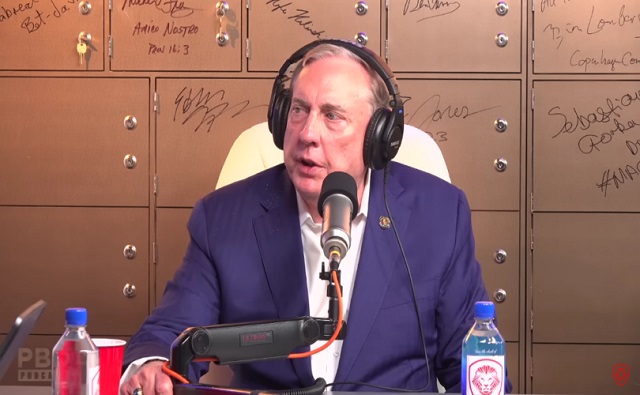espionage
Canada’s security agency confirms Chinese agents worked directly to elect MPs

From LifeSiteNews
Canadian Security Intelligence Service (CSIS) director David Vigneault testified to the ongoing Foreign Interference Commission that he supports the ‘conclusions’ that Communist China was working to help elect regime-friendly Canadian MPs.
During testimony last week at the inquiry looking into alleged meddling in Canada’s last two federal elections, the head of the nation’s intelligence agency confirmed that agents of the Chinese Communist Party (CCP) did help to elect “pro-China” candidates, also disclosing the existence of a large cash payments scheme totaling $250,000.
David Vigneault, who serves as the Canadian Security Intelligence Service (CSIS) director, told the inquiry, titled the Foreign Interference Commission, that he supports the “conclusions” that the CCP was working to help elect China-friendly Canadian MPs.
“I support those conclusions,” he said after pointing out documents that show large cash payments to unnamed public office holders.
“These words have been crafted very carefully,” he said, adding, “For the Commission record I support those conclusions. I would not want to go further.”
The Foreign Interference Commission was convened to “examine and assess the interference by China, Russia, and other foreign states or non-state actors, including any potential impacts, to confirm the integrity of, and any impacts on, the 43rd and 44th general elections (2019 and 2021 elections) at the national and electoral district levels.”
The Commission is being headed by Justice Marie-Josée Hogue, who had earlier said that she and her lawyers will remain “impartial” and will not be influenced by politics and began on January 29.
In January, Hogue said that she would “uncover the truth whatever it may be.”
The CSIS director’s comments came as a result of an internal federal memo, the After Action Report 2021 Federal Election, which noted how “The People’s Republic of China sought to clandestinely and deceptively influence Canada’s 2021 federal election.”
The memo, dated December 17, 2021, reads that the “foreign influence was pragmatic in nature and focused primarily on supporting individuals viewed to be either ‘pro-PRC’ or ‘neutral’ on issues of interest to the People’s Republic of China government and Chinese Communist Party.”
The document was put together by the Security and Intelligence Threats to Elections Task Force.
“The Task Force also observed online media activities aimed at discouraging Canadians particularly of Chinese heritage from supporting the Conservative Party of Canada, Party leader Erin O’Toole and particularly former Steveston-Richmond East candidate Kenny Chiu,” reads the Action Report.
Counsel for Conservative MP Michael Chong asked Vigneault during the Commission hearings if CSIS agreed with the Action Report.
“I recognize this information,” said Vigneault in reply.
Thus far, the testimony at the Commission has revealed that former Conservative Party of Canada (CPC) MP Kenny Chiu said he felt “betrayed” by the federal government after only now learning he was the target of agents of the CCP.
Also, the public has learned via the inquiry from Chief Electoral Officer Stéphane Perrault that he was secretly warned by security agents of irregularities in the 2019 election.
‘Politically-Connected Canadian’ linked to cash payments of $250,000 to influence 2019 election
Last week, the Commission released a CSIS report titled People’s Republic Of China: Threat Actors, Contact With Candidates And Funding Of Threat Actors, which documents the large cash payments of “$250,000 from People’s Republic of China officials in Canada possibly for foreign influence-related purposes.”
“Prior to and during the 43rd general election in 2019 a group of known and suspected People’s Republic of China related threat actors in Canada including PRC officials worked in loose coordination with one another to covertly advance PRC interests through Canadian democratic institutions,” wrote the agency in the report.
The report lists that 11 political candidates as well as 13 political staff members were “assessed to be either implicated in or impacted by this group of threat actors,” and that “some of these threat actors received financial support from the People’s Republic of China.”
“For example, there likely were at least two transfers of funds approximating $250,000 from People’s Republic of China officials in Canada possibly for foreign influence-related purposes though most likely not in an attempt to covertly fund the 11 candidates,” the report reads.
“These were transferred via multiple individuals to obfuscate their origins via an influential community leader, to the staff member of a 2019 federal election candidate and then to an Ontario MPP. The transfers reportedly took place in late 2018, early 2019.”
Vigneault confirmed last Thursday that the reports were accurate, saying about them, “That is a correct statement,” but added the agency is not able to “discuss classified information.”
As for the unnamed “Politically-Connected Canadian,” Vigneault said that he would “not have any specific comment about political matters as you can imagine.”
The Commission also included an In Camera Examination Summary in which CSIS discussed “possible People’s Republic of China interference” which took place at the 2019 Liberal Party nomination, which was won by MP Han Dong.
Another document showed that there was a “potential foreign interference by a politically connected Canadian” in 2019, however, this person was not named.
The summary said that this person had “not previously been identified as acting on behalf of a foreign state but appeared to have been doing so in the period leading up to the 2019 election.”
“The report initially assessed it likely the actor ‘has already had an impact on the 2019 federal election and will remain a foreign interference threat after the election,’” it noted.
When it comes to the CCP, many Canadians, especially pro-freedom Chinese Canadians, are concerned with the nation’s influence in what is supposed to be a democratic process.
As for Prime Minister Justin Trudeau, he has in the past praised China for its “basic dictatorship” and has labeled the authoritarian nation as his favorite country other than his own.
espionage
One in five mail-in voters admitted to committing voter fraud during 2020 election: Rasmussen poll

From LifeSiteNews
21% of mail-in voters admitted to illegally filling out a ballot on someone else’s behalf, and 17% admitted to voting from a state where they are not a legal resident.
One-fifth of voters who cast mail-in ballots during the 2020 presidential election admitted to committing at least one kind of voter fraud, according to the results of a recent poll conducted by Rasmussen Reports and The Heartland Institute.
Tucker Carlson posted to X on Friday an excerpt of a discussion with Justin Haskins, director of the Socialism Research Center at the Heartland Institute, in which Haskins explained how a poll conducted together with Rasmussen Reports revealed widespread illegal voter activity among mail-in voters during the 2020 election. The poll was first published in December, 2023.
About one in five mail-in ballots in the last election was fraudulent, handing Biden the presidency. We know this because the people who committed the fraud have admitted it in a new poll. pic.twitter.com/fxHL9hT4sw
— Tucker Carlson (@TuckerCarlson) April 26, 2024
Respondents who indicated that they voted by mail in the 2020 election were asked a series of questions probing for illegal, fraudulent activity, although the questions did not explicitly label these activities as “fraud.”
“For example, we asked people, ‘Did you vote in a state where you’re no longer a legal resident? If you’re not a permanent resident of a state, you can’t vote there. 17% of people, nearly one in five, said yes,” Haskins told Carlson.
He further shared that 21% of mail-in voters admitted to filling out a ballot on behalf of someone else, another illegal activity, and 17% admitted to forging a signature on someone else’s behalf, “with or without their permission.”
“So all told, it’s at least one in five mail-in ballots involved some kind of fraudulent activity,” said Haskins.
Of all voter respondents — both those who voted by mail and those who voted in person —10% said that “a friend, family member, co-worker, or other acquaintance” admitted to them that they voted by mail in a state other than the one they are registered in as their state of permanent residence.
“The results of this survey are nothing short of stunning,” Haskins remarked following the poll results. “For the past three years, Americans have repeatedly been told that the 2020 election was the most secure in history. But if this poll’s findings are reflective of reality, the exact opposite is true. This conclusion isn’t based on conspiracy theories or suspect evidence, but rather from the responses made directly by the voters themselves.”
“A democratic republic cannot survive if election laws allow voters to commit fraud easily, and that’s exactly what occurred during the 2020 election,” he continued. “Although some progress has been made in more than a dozen states since the conclusion of the 2020 election, much more work is needed in most regions of the United States. If America’s election laws do not improve soon, voters and politicians will continue to question the truthfulness and fairness of all future elections.”
Carlson pointed out that claims that the 2020 presidential election results were based on fraudulent votes are considered a “criminal offense” now in the U.S., at least to the extent that “that crime appears to form the basis of one of Trump’s pending indictments.” The indictment in question claims that Trump used “false claims of election fraud to obstruct the federal government function by which those results are collected, counted, and certified.”
Mounds of evidence of fraud in the 2020 general election have emerged, but this has been widely ignored by the mainstream media.
For example, in 2022, a peer-reviewed paper from accomplished economist and former senior researcher for the Department of Justice (DOJ), John Lott, compiled statistical evidence of voter fraud in the 2020 election, specifically, of about “255,000 excess votes (possibly as many as 368,000) for Joe Biden in six swing states where Donald Trump lodged accusations of fraud.”
Batches of votes that were suspiciously tallied overwhelmingly for Biden were reported the night of the election, reversing a former Trump lead in states like Pennsylvania and Wisconsin. And before the election, Project Veritas released a video showing voters being bribed and coaxed to vote for Democrats, including by changing their votes on the ballot.
espionage
Canada’s intelligence chief says he personally warned Trudeau about China’s election meddling

David Vigneault
From LifeSiteNews
Canadian Security Intelligence Service director David Vigneault authenticated memos used during private meetings with the prime minister as well as his staff concerning Chinese Communist deception.
The head of Canada’s intelligence agency testified under oath that he gave Justin Trudeau multiple warnings that agents of the Communist Chinese Party (CCP) were going after Conservative MPs yet the prime minister has denied he ever got these warnings.
In what appears to be a contradiction of Trudeau’s claim that he was not briefed directly about CCP meddling in Canada’s electoral process, Canadian Security Intelligence Service (CSIS) director David Vigneault said late last week at the Foreign Interference Commission that he indeed had “communicated” the issues.
He then authenticated memos used during private meetings with Trudeau as well as his staff concerning CCP deception, which was also noted in a “top secret” memo titled Briefing to the Prime Minister’s Office on Foreign Interference Threats to Canada’s Democratic Institutions, dated February 21, 2023.
The six-page memo went into full detail as to the extent of CCP subterfuge that targeted Canada’s Conservative Party in the 2019 and 2021 federal elections.
The memo read that CCP agents “were almost certainly motivated by a perception the Conservative Party of Canada was promoting a platform that was perceived to be anti-China,” also stating that 2021 election anomalies were “aimed at discouraging Canadians, particularly of Chinese heritage, from supporting the Conservative Party, leader Erin O’Toole and particularly Steveston-Richmond East candidate Kenny Chiu.”
“We know the People’s Republic of China clandestinely and deceptively interfered in both the 2019 and 2021 general elections,” the memo reads.
Vigneault confirmed he used similar language when speaking with Trudeau and political aides.
At the Commission inquiry, Gib van Ert, counsel for Conservative MP Michael Chong, asked Vigneault if “this knowledge something you or the Canadian Security Intelligence Service as a body communicated to the Prime Minister?”
“It is indeed something I communicated,” Vigneault replied.
Thomas Jarmyn, counsel for Erin O’Toole, then asked if “Those words were chosen with intention?”
“Yes, these words are carefully selected,” Vigneault replied.
Earlier this week, LifeSiteNews reported that details from the “top secret” memo have shown that Trudeau’s office was giving explicit warnings by Canadian intelligence that agents of the CCP were an “existential threat to Canadian democracy.”
The Foreign Interference Commission was convened to “examine and assess the interference by China, Russia, and other foreign states or non-state actors, including any potential impacts, to confirm the integrity of, and any impacts on, the 43rd and 44th general elections (2019 and 2021 elections) at the national and electoral district levels.”
The Commission is being headed by Justice Marie-Josée Hogue, who had earlier said that she and her lawyers will remain “impartial” and will not be influenced by politics and began January 29.
In January, Hogue said that she would “uncover the truth whatever it may be.”
Spy head: Trudeau was ‘briefed’
Last week, the commission learned about another “secret” memo from October 26, 2022, about “clandestinely supported candidates” states that “People’s Republic of China officials could be emboldened in their electoral interference efforts by the 2021 defeat of former Richmond MP Kenny Chiu.”
During testimony at the commission, Vigneault confirmed that he mentioned the matter with Trudeau, saying, “This is one of the cases I briefed the Prime Minister on that day.”
Shantona Chaudhury, counsel for the commission, asked him if he was able to recall “whether that is something you conveyed to the Prime Minister?”
“I don’t remember if I used these exact words but talking about that specific case, I put that case in context in relation to other People’s Republic of China activities,” Vigneault replied.
Nando de Luca, counsel for the Conservative Party, then asked Vigneault if the information was specifically communicated to Trudeau.
“I can tell you some of that information was absolutely used to brief on a very specific topic,” Vigneault replied.
Vigneault then noted that all the top-secret memos, which were composed for his meetings with Trudeau’s office, contained many facts as well as similar language he had spoken of many times.
“I have verbalized some of these issues in the past,” Vigneault told the commission.
Despite the warnings given to Trudeau’s office, not once were opposition MPs warned that they were a target of CCP agents.
In May 2023, Trudeau said to reporters that he did not know anything about CCP agents targeting conservative MPs.
“The Canadian Security Intelligence Service knew about certain things but didn’t feel it reached a threshold that required them to pass it up out of CSIS,” he said.
“Was it briefed up out of the Canadian Security Intelligence Service? It was not,” he added, saying that “CSIS made the determination it wasn’t something that needed to be raised to a higher level because it wasn’t a significant enough concern.”
-

 Censorship Industrial Complex2 days ago
Censorship Industrial Complex2 days agoDesperate Liberals move to stop MPs from calling Trudeau ‘corrupt’
-

 conflict2 days ago
conflict2 days agoCol. Douglas Macgregor torches Trump over support for bill funding wars in Ukraine and Israel
-

 Frontier Centre for Public Policy1 day ago
Frontier Centre for Public Policy1 day agoThe end of Canada: The shift from democracy to totalitarian behavior in the ‘pandemic era’
-

 Energy1 day ago
Energy1 day agoReflections on Earth Day
-

 Alberta19 hours ago
Alberta19 hours agoAlberta rejects unconstitutional cap on plastic production
-

 Great Reset2 days ago
Great Reset2 days agoTerrorists Welcome: Chronic counterterrorism lapses at the border demand investigation
-

 Business18 hours ago
Business18 hours agoUN plastics plans are unscientific and unrealistic
-

 conflict2 days ago
conflict2 days agoCol. Douglas Macgregor: US is ‘facing disaster’ as it funds overseas wars while bankrupt






